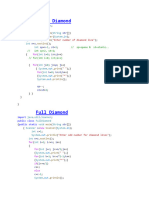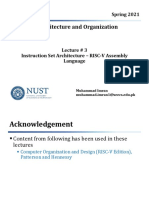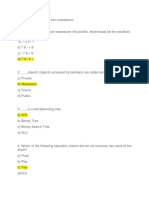Better Programmer Task
Uploaded by
mahesh225Better Programmer Task
Uploaded by
mahesh225package betterprogrammer;
import java.util.ArrayList;
import java.util.Arrays;
import java.util.HashMap;
import java.util.HashSet;
import java.util.LinkedHashMap;
import java.util.List;
import java.util.Map;
import java.util.Set;
public class BetterProgrammerTask {
public static List<Integer> getPrimeNumbers(int from, int to) {
/*
Please implement this method to
return a list of all prime numbers in the given range (inclusively).
A prime number is a natural number that has exactly two distinct natural
number divisors, which are 1 and the prime number itself.
The first prime numbers are: 2, 3, 5, 7, 11, 13
*/
List<Integer> primos = new ArrayList<Integer>();
from = from<2?2:from;
boolean primo = true;
for(int i = from; i<=to;i++){
for(int j = 2;j<i;j++){
if(i%j==0){
primo = false;
break;
}
}
if(primo){
primos.add(i);
}else{
primo=true;
}
}
return primos;
}
public static int countAlmostPrimeNumbers(int from, int to) {
/*
A prime number is a natural number that has exactly two distinct natural
number divisors,
which are 1 and the prime number itself.
The first prime numbers are: 2, 3, 5, 7, 11, 13.
Almost prime numbers are the non-prime numbers
which are divisible by only a single prime number.
Please implement this method to
return the number of almost prime numbers within the given range
(inclusively).
*/
List<Integer> primos = getPrimeNumbers(from, to);
int cuenta = 0;
int cuentaRet = 0;
for(int i=from;i<=to;i++){
for(Integer primo : primos){
if(i%primo==0){
cuenta++;
}
}
if(cuenta == 1){
cuentaRet++;
}else{
cuenta=0;
}
}
return cuentaRet;
}
public static Change getCorrectChange(int cents) {
/*
Please implement this method to
take cents as a parameter
and return an equal amount in dollars and coins using the minimum
number of
coins possible.
For example: 164 cents = 1 dollar, 2 quarters, 1 dime and 4 cents.
Return null if the parameter is negative.
*/
if(cents <0){
return null;
}
if(cents == 0){
return new Change(0, 0, 0, 0, 0);
}
int dollars = 0;
if(cents >=100){
dollars = cents/100;
}
int modulo100 = cents%100;
int modulo25 = modulo100%25;
int modulo10 = modulo25%10;
int quarters = modulo100/25;
int dimes = modulo25/10;
int nickels = modulo10/5;
int centavos = modulo10%5;
return new Change(dollars,quarters,dimes,nickels,centavos);
}
// Please do not change this class
static class Change {
private final int _dollars;
private final int _quarters; //25 cents
private final int _dimes; // 10 cents
private final int _nickels; // 5 cents
private final int _cents; // 1 cent
public Change(int dollars, int quarters, int dimes, int nickels, int
cents) {
_dollars = dollars;
_quarters = quarters;
_dimes = dimes;
_nickels = nickels;
_cents = cents;
}
public int getDollars() {
return _dollars;
}
public int getQuarters() {
return _quarters;
}
public int getDimes() {
return _dimes;
}
public int getNickels() {
return _nickels;
}
public int getCents() {
return _cents;
}
@Override
public String toString() {
return _dollars + " dollars " + _quarters + " quarters " +
_nickels + " nickels " + _cents + " cents";
}
}
// Please do not change this interface
public static interface Node {
int getValue();
List<Node> getChildren();
}
public static double getAverage(Node root) {
/*
Please implement this method to
return the average of all node values (Node.getValue()) in the tree.
*/
int suma = root.getValue() + suma(root.getChildren());
int count = 1 + count(root.getChildren());
return suma/count;
}
private static int suma(List<Node> nodes){
if(nodes == null || nodes.isEmpty()){
return 0;
}
int suma = 0;
for(Node n : nodes){
suma += n.getValue() + suma(n.getChildren());
}
return suma;
}
private static int count(List<Node> nodes){
if(nodes == null || nodes.isEmpty()){
return 0;
}
int suma = 0;
for(Node n : nodes){
suma += 1 + count(n.getChildren());
}
return suma;
}
public static int getClosestToZero(int[] a) {
/*
Please implement this method to
return the number in the array that is closest to zero.
If there are two equally close to zero elements like 2 and -2
- consider the positive element to be "closer" to zero.
*/
Arrays.sort(a);
for(int i = 0;i<a.length;i++){
if(a[i] > 0){
return a[i];
}
}
return a[a.length-1];
}
public static int[] removeDuplicates(int[] a) {
/*
Please implement this method to
remove all duplicates from the original array. Retain the order of the
elements and
always retain the first occurrence of the duplicate elements.
For example, parameter: {2,1,2,3}, result: {2,1,3}
*/
Map<Integer, Integer> mapa = new LinkedHashMap<Integer, Integer>();
int [] ret = new int [a.length];
int index = 0;
for(int i = 0;i<a.length;i++){
if(mapa.get(a[i])==null){
mapa.put(a[i], 1);
ret[index++] = a[i];
}
}
return Arrays.copyOfRange(ret, 0, index);
}
public static int countWaysToJump(int N) {
/*
A set of stairs has N steps.
You can jump either 1 or 2 steps at a time.
For example, if the stairs is N=4 steps, you can reach the end in 5
possible ways:
1-1-1-1, or 1-2-1 or 1-1-2 or 2-1-1 or 2-2
Please implement this method to
return the count of the different ways to reach the end of the stairs with
N steps.
*/
String[] steps = getSteps(N);
for(int i = 0; i<steps.length;i++){
System.out.println(steps[i]);
}
return steps.length;
}
private static String[] getSteps(int N){
if(N==0) return new String[] {};
if(N==1) return new String[] {"1"};
if(N==2) return new String[] {"11", "2"};
String[] concat = concat(1,getSteps(N-1));
String[] concat2 = concat(2,getSteps(N-2));
String [] arrRet = new String[concat.length + concat2.length];
for(int i = 0;i<concat.length;i++){
arrRet[i]=concat[i];
}
for(int i = concat.length, j = 0;j<concat2.length &&
i<(concat.length + concat2.length);i++,j++){
arrRet[i]=concat2[j];
}
return arrRet;
}
private static String[] concat(int N,String[] strArr){
for(int i = 0;i<strArr.length;i++){
strArr[i] = N + "" + strArr[i];
}
return strArr;
}
public static int countWords(String s) {
/*
Please implement this method to
return the word count in a given String.
Assume that the parameter String can only contain spaces and alphanumeric
characters.
*/
String[] split = s.split("\\s+");
int suma = 0;
for(String st : split){
if(st.equals("")){
continue;
}
suma++;
}
return suma;
}
public static String reverseWords(String s) {
/*
Assume that the parameter String can only contain spaces and alphanumeric
characters.
Please implement this method to
reverse each word in the original String while maintaining the word order.
For example:
parameter: "Hello world", result: "olleH dlrow"
*/
String ret = "";
String[] words = s.split(" ");
for(String palabra : words){
ret += revertString(palabra) + " ";
}
return ret.trim();
}
private static String revertString(String palabra) {
String ret = "";
for(int i = palabra.length()-1;i>=0;i--){
ret+=palabra.charAt(i);
}
return ret;
}
public static int getCountOfOnes(int n) {
/*
Please implement this method to
return the number of '1's in the binary representation of n
for any integer n, where n > 0
Example: for n=6 the binary representation is '110' and the number of '1's
in that
representation is 2
*/
String binary = Integer.toBinaryString(n);
int suma = 0;
for(int i = 0;i<binary.length();i++){
if(binary.charAt(i) == '1'){
suma++;
}
}
return suma;
}
public static Set<Object> getUniqueElements(Set<Object> a, Set<Object> b) {
/*
Please implement this method to
return a set of elements that can be found only in set a or set b,
but not in both Sets.
The method should not change the content of the parameters.
*/
Set<Object> c = new HashSet<Object>(a);
c.removeAll(b);
Set<Object> d = new HashSet<Object>(b);
d.removeAll(a);
HashSet<Object> newSet = new HashSet<Object>(c);
newSet.addAll(d);
return newSet;
}
// Please do not change this interface
interface ListNode {
int getItem();
ListNode getNext();
void setNext(ListNode next);
}
public static ListNode reverse(ListNode node) {
/*
Please implement this method to
reverse a given linked list.
*/
List<ListNode> lista = new ArrayList<BetterProgrammerTask.ListNode>();
lista.add(node);
while(node.getNext()!=null){
lista.add(node.getNext());
node = node.getNext();
}
node = lista.get(lista.size()-1);
if(lista.size()>1){
for(int i=lista.size()-1;i>0;i--){
node.setNext(lista.get(i-1));
}
}
return node;
}
public static boolean isPalindrome(String s) {
/*
Definition: A palindrome is a string that reads the same forward and
backward.
For example, "abcba" is a palindrome, "abab" is not.
Please implement this method to
return true if the parameter is a palindrome and false otherwise.
*/
int topIndex = s.length()%2==0?s.length()/2:(s.length()-1)/2;
for(int i = 0;i<topIndex;i++){
if(s.charAt(i) != s.charAt(s.length()-1-i)){
return false;
}
}
return true;
}
public static Object[] reverseArray(Object[] a) {
/*
Please implement this method to
return a new array where the order of elements has been reversed from the
original
array.
*/
Object[] ret = new Object[a.length];
for(int i = a.length-1;i>=0;i--){
ret[a.length-i] = a[i];
}
return ret;
}
public static class WriteOnceMap<K, V> extends HashMap<K, V> {
private static final long serialVersionUID = 6107826937414787796L;
@Override
public V put(K key, V value) {
/*
WriteOnceMap is a map that does not allow changing value for a
particular key.
It means that put() method should throw IllegalArgumentException if the
key is already
assosiated with some value in the map.
Please implement this method to conform to the above description of
WriteOnceMap.
*/
if(get(key)==null){
put(key,value);
}else{
throw new IllegalArgumentException("");
}
return value;
}
@Override
public void putAll(Map<? extends K, ? extends V> m) {
/*
Pleaase implement this method to conform to the description of
WriteOnceMap above.
It should either
(1) copy all of the mappings from the specified map to this map or
(2) throw IllegalArgumentException and leave this map intact
if the parameter already contains some keys from this map.
*/
Set<K> keySet2 = new HashSet<K>(this.keySet());
Set<K> keySet3 = new HashSet<K>(m.keySet());
keySet3.removeAll(keySet2);
if(keySet3.size()!=m.keySet().size()){
throw new IllegalArgumentException("");
}
for(K key : m.keySet()){
put(key,m.get(key));
}
}
}
public static int getSumOfNumbers(String s) {
/*
Please implement this method to
return the sum of all integers found in the parameter String. You can
assume that
integers are separated from other parts with one or more spaces (' '
symbol).
For example, s="12 some text 3 7", result: 22 (12+3+7=22)
*/
String[] toks = s.split(" ");
int suma = 0;
for(String tok : toks){
try{
suma += Integer.valueOf(tok);
}catch(NumberFormatException nfe){
continue;
}
}
return suma;
}
public static String capitalizeFirstLetters(String s) {
/*
Please implement this method to
capitalize all first letters of the words in the given String.
All other symbols shall remain intact. If a word starts not with a letter,
it shall remain intact too.
Assume that the parameter String can only contain spaces and alphanumeric
characters.
NOTE: please keep in mind that the words can be divided by single or
multiple spaces.
The spaced also can be found at the beginning or the end of the parameter
string,
and you need to preserve them.
*/
String[] words = s.split(" ");
String ret = "";
for(String tok :words){
if(tok.equals("")){
ret += " ";
}else if(tok.indexOf(" ") != -1){
ret += tok;
}else if(tok.length()==1){
ret += tok.toUpperCase();
}else{
ret += " " + tok.substring(0, 1).toUpperCase() +
tok.substring(1, tok.length());
}
}
return ret;
}
public static void main(String[] args){
// int[] a = new int[]{-1,3,0,1,0,5};
// System.out.println(getClosestToZero(a));
// int[] a = new int[]{2,1,2,3};
// int[] removeDuplicates = removeDuplicates(a);
// for(int i = 0;i<removeDuplicates.length;i++){
// System.out.println(removeDuplicates[i]);
// }
// System.out.println(countWords("hola nacho como estas"));
//System.out.println(getCountOfOnes(6));
// Set<Object> uniqueElements = getUniqueElements(new HashSet<Object>
(Arrays.asList(1,2,3)),new HashSet<Object>(Arrays.asList(3,4,5,1)));
// for(Object i : uniqueElements){
// System.out.println((Integer)i);
// }
// System.out.println("Total: " + countWaysToJump(5));
// System.out.println(isPalindrome("a"));
// System.out.println(reverseWords("Hola nacho"));
// System.out.println(getSumOfNumbers("12 some text 3 7"));
// System.out.println(capitalizeFirstLetters(" hola nacho como and as "));
// System.out.println(countWords(" hola nacho como and as "));
// System.out.println(getCorrectChange(632));
// System.out.println(countAlmostPrimeNumbers(0,100));
// List<Integer> primos = getPrimeNumbers(0, 14);
// for(Integer i : primos){
// System.out.println(i);
// }
}
}
You might also like
- Accenture Preaperation Coding Question SetNo ratings yetAccenture Preaperation Coding Question Set13 pages
- Commonly Asked Java Programming Interview Questions: Selfless (Freshersjob)No ratings yetCommonly Asked Java Programming Interview Questions: Selfless (Freshersjob)16 pages
- Amazon Interview Questions With Solutions JavaNo ratings yetAmazon Interview Questions With Solutions Java13 pages
- Javalab - 7 Methods: Final Double PI 3.14159No ratings yetJavalab - 7 Methods: Final Double PI 3.141594 pages
- Q. Enter A String and Print Number of Vowels and Consonants Present in It Using A ConstructorNo ratings yetQ. Enter A String and Print Number of Vowels and Consonants Present in It Using A Constructor6 pages
- Rudra D. 100+ Java Programs Examples. Best For Beginners... 2023No ratings yetRudra D. 100+ Java Programs Examples. Best For Beginners... 202366 pages
- Final Code Compilation IN Data Structure: SUBMITTED BY: JP Parungao & Renz Hidalgo BSCS201No ratings yetFinal Code Compilation IN Data Structure: SUBMITTED BY: JP Parungao & Renz Hidalgo BSCS20129 pages
- Odule Ractice Xcercises: Name:Mohamed Ashraf MA Roll No:20F131No ratings yetOdule Ractice Xcercises: Name:Mohamed Ashraf MA Roll No:20F1315 pages
- 02 - SW Design Principles - OOP ConceptsNo ratings yet02 - SW Design Principles - OOP Concepts67 pages
- Ebook Calculus Early Transcendental Functions 4Th Edition Smith Solutions Manual Full Chapter PDF100% (19)Ebook Calculus Early Transcendental Functions 4Th Edition Smith Solutions Manual Full Chapter PDF67 pages
- (Ebooks PDF) Download Beginning Visual C 2012 Programming 1st Edition Karli Watson Full Chapters100% (13)(Ebooks PDF) Download Beginning Visual C 2012 Programming 1st Edition Karli Watson Full Chapters70 pages
- Microsoft Visual C# Step by Step, 9th Edition John Sharp pdf download100% (5)Microsoft Visual C# Step by Step, 9th Edition John Sharp pdf download57 pages
- Openmusic: Design and Implementation Aspects of A Visual Programming LanguageNo ratings yetOpenmusic: Design and Implementation Aspects of A Visual Programming Language8 pages
- Program For Converting Infix To Postfix ExpressionNo ratings yetProgram For Converting Infix To Postfix Expression5 pages
- (eBook PDF) Starting Out with Java: From Control Structures through Data Structures 4th Editioninstant download100% (4)(eBook PDF) Starting Out with Java: From Control Structures through Data Structures 4th Editioninstant download64 pages
- Program For Searching A Number or Character in String For 8086No ratings yetProgram For Searching A Number or Character in String For 808623 pages

























































































